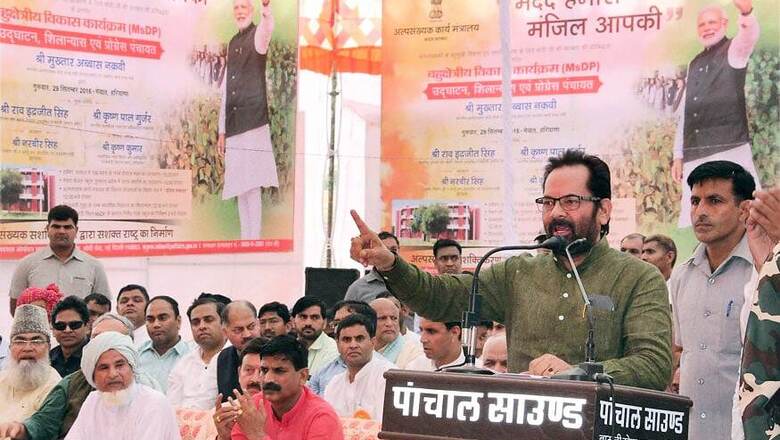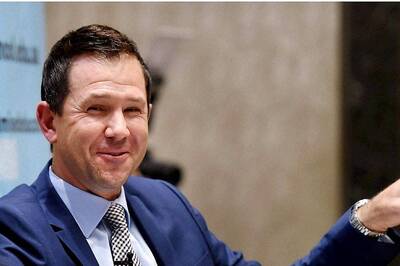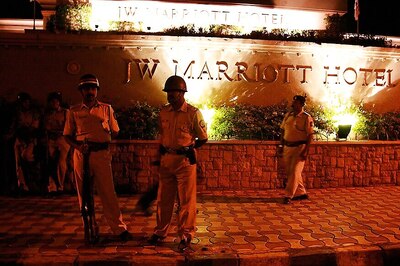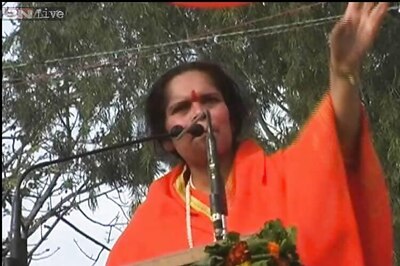
views
New Delhi: For the first time since independence, a Shia, Mukhtar Abbas Naqvi, became the Cabinet minister. Naqvi is the minister of Minority Affairs and chairperson of the Central Waqf Council, which is a statutory body set up in 1964 according to a provision in the Waqf Act, 1954. Its role was to advise the central government on matters concerning the working of the Waqf Boards and the due administration of auqaf (property).
“But what did Naqvi sahib do for the Waqf issue? Nothing. Recently we celebrated a huge victory of relieving the Jor Bagh Karbala property from the clutches of encroachers, and his role was nil, this one case where the guilty also have to pay the compensation,” said Bahadur Abbas Naqvi, general secretary of Anjuman-e-Haideri, Karbala Jor Bagh.
He mentioned Sunni advocate Mehmood Paracha who helped the Shia community in winning the Jor Bagh waqf property case. The moment will have political implications, with Paracha and Shia cleric Kalbe Jawwad coming together on one stage on March 24 at Jor Bagh Karbala. The two forged a bond of “Shia-Sunni unity” and “established the movement for protecting the waqf properties”.
The disenchantment over the Waqf issue
In Bahadur Abbas Naqvi’s opinion, this picture of Jawwad and Paracha together will take away some of the Shia votes from BJP. Historically, there has been a chunk of Shias voting for the BJP since the saffron party also understand their aspirations. Former prime minister Atal Bihari Vajpayee was elected from Lucknow five times. Home minister Rajnath Singh has shown up at Shia gatherings and interacted with prominent community leaders.
“But after the Jor Bagh waqf property victory, with Paracha and Jawwad coming together, a chasm between the two communities has been bridged, which is likely to pinch the saffron party for Shia votes,” said Bahadur Abbas Naqvi.
Husaini Tigers, an outfit of Shia youth in Lucknow, campaigned against the Samajwadi Party due to its negligence towards Waqf property. The BJP promised a CBI inquiry against the accused head of Shia Waqf board Waseem Rizvi and Azam Khan.
“But after coming to power, the Yogi Adityanath government ordered a probe but nothing happened. We invested faith in the BJP — they will work to punish those who encroached upon our waqf property,” said Shamil Shamsi from the outfit.
He added, “Today, we are not in a position where we go door-to-door campaigning against the secular parties — we cannot repeat the 2014 and 2017 act of helping the BJP.”
Shamsi said this anger over the waqf property issue is going to have resonance in Shia-dominated Lok Sabha constituencies. According to community leaders, there are 20% Shias in the country, with 22% in Uttar Pradesh. There are 30 seats with 50,000 Shia votes and 25 seats with 25,000 Shia votes in Uttar Pradesh alone.
"BJP samjhti hai bas…kuch karti nahi…"
News 18.com covered a story on decoding Shia BJP alignment in 2018 – we got in touch with Yasoob Abbas, a Shia leader and member of the All India Shia Personal Law Board who demanded setting up of a panel on the lines of the Sachar Commission to assess the realities of the community. He said, “Justice Sachar did not represent the issues of Shias. We are scattered and are a minority within a minority, somewhere the BJP understands us and our aspirations, but even they have done no work for the uplift of Shias.”
For Shia processions, freedom to follow Muharram without any fear of being attacked is important. These are the things that the BJP government assures – recently the BJP government started a flight for Najaf, the holy place for Shias. The ministries and commissions have Shia representatives. But the community’s larger issues of economic upliftment have not been looked into, according to Shia leaders we spoke to. “Secular parties think Shiyon ke chakkar me Sunni ko naraaz nahi kar sakte (we cannot anger the Sunni community because of the Shias), we don’t have the numbers and are minority within a minority,” said Shamsi.
Abbas said, “We have made this demand to other government also, but we have more hope with the BJP government to look into the issues of unemployment, lack of education among Shias. We wrote to the authorities to set up a Sachar-like Commission and report on our condition – no development so far.”
In the previous government, Azam Khan was not sensitive to demands of Shias. “He was not our friend,” Abbas had earlier said.
Empowerment together, victims together
The Shias and Sunnis have together launched the Waqf Protection Movement. Naqvi said the two communities might not be on the same line politically but with awareness of their heritage and waqf, there is potential to bring them on the same page politically. “The Muslim community is blessed with what our ancestors left for us – our properties. We are realising that we don’t need any favours and subsidies from any government if our waqf is fully realised,” he added.
There is a Central Waqf Council governing state waqf boards, looking into the implementation of rules and regulations. There are single Muslim Waqf boards with Shia representatives present, such as the one in New Delhi, and if income from Shia properties is more than 15%, a separate Shia board is formed. “Only 25% of Muslim waqf properties have been protected, 75% of our properties have not even been registered,” said Naqvi.
Advocate Mehmood Paracha, who is cementing the two communities ahead of the Lok Sabha elections through waqf cause, spoke to News 18.com on the sidelines of preparing a new proposal for a “Society for protection of Waqf and Heritage.” “Waqf property worth Rs 60 lakh crore is under encroachment by governmental and non-governmental agencies and to free it from the clutches of mafias Shias and Sunnis have to work together,” he said.
Paracha said this will have repercussions on the BJP’s Shia voters. “Things seem to be changing – the enemy’s enemy is not always a friend,” he said.
No evidence of Shia-BJP bond
The shia community and the intellectuals claim that the BJP-Shia equation is blown out of proportion to suit the saffron party's politics of creating divisions.
Justice Haider Abbas Razi, who retired as a senior judge from Lucknow High Court, countered the charges and said, “The Shias close to power are the ones with a vested interest. The BJP government also knows this and uses their opportunism to create the Shia-Sunni divide. They will get those people who can speak in divisive language. They hold no power among the Shia public.”
Ali Khan Mahmudabad, an academic and spokesperson of Samajwadi Party, said, "There are a number of so-called high profile leaders who have tried to create the BJP-Shia equation for their own vested interests. Also, the only place where a small percentage of Shia votes goes to the BJP is Lucknow and not in other constituencies."
Other Shia leaders said that the BJP tries to attract the Shia votes as it appeals to the sentiment of "minority within a minority".
But Mahmudabad said, "The BJP and the RSS are trying to use the narrative of the acceptable Muslim- Shias and Sufis - to create fissures within the community because this fits their "war on terror" narrative and also tries to disaggregate their opposition to all Muslims."
"BJP-RSS people think these specific Muslim groups, shia, are more Indian because of their cultural practices. Hence, they are using internal sectarian polemics for their own political gain but there is no data to show that this effects vote casting," he added.




















Comments
0 comment